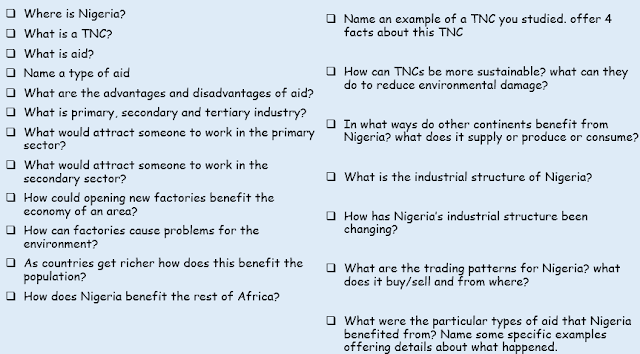In geography we have completed the teaching of the course and are beginning to use lesson time to revise. Last year, as a team we developed a variety of strategies and were grateful to source lots of inspiration from other teachers on Twitter and forums like Schoology. Whilst lots of the tasks were great in terms of what the pupils produced, we are interested in trying to make sure that pupils are retaining the information and not just writing lots all lesson.
To help us with this, we are instructing pupils to revise in slightly different ways. Having become familiar with the PLCs on PiXL, we were keen to arm our pupils with the resources to organise their revision themselves. We know that these checklists can be useful, as they help pupils to think about all of the components that make up each topic. Even though they are useful, we still worried that they were sometimes not clear enough in exactly what the student would need to know, or how the question would be worded. As teachers more familiar with the content and assessment objectives, we can more easily anticipate the short response parts of the course, and the sort of concepts that are likely to require an extended answer.
So having thought about it, we have created lists of questions that un-pick in greater depth the different parts of each topic. We have printed the question lists and used this as a starting point to get the students to revise. Some pupils are making flashcards to help them remember key words, some pupils are creating slightly more detailed notes, whilst others are testing each other, writing quizzes and playing revision pictionary. In getting the pupils to work through the questions themselves, they are identifying gaps in their learning.
"I like using these are they are worded more simply than the exam board checklists"- Year 11 student
"It is nice to have everything all in one place, I like the simple questions as it is reassuring to tick things off at the start of revising a topic" Year 11 student.
A final feature of the lists of questions that has been working is that we have broken down the required knowledge into much smaller ideas. This is helping those who might have been on the foundation tier under the old GCSE Specification, as they recognise there is a lot of the course they can feel confident in. For those who would traditionally have accessed the higher tier, they are finding a confidence boost in being able to move past the short response content, and they are focused on revising the details of parts of the course they have not remembered in full.
Finally, to help to reinforce our new focus on retaining information and not writing lots in revision lessons. We have built in quiz sections to the end of these lessons, playing games such as key word taboo. Pupils have also been trialing building an essay answer using just a short collection of words or facts, to help them to learn how successful very concise notes can be.
Author LWR
To help us with this, we are instructing pupils to revise in slightly different ways. Having become familiar with the PLCs on PiXL, we were keen to arm our pupils with the resources to organise their revision themselves. We know that these checklists can be useful, as they help pupils to think about all of the components that make up each topic. Even though they are useful, we still worried that they were sometimes not clear enough in exactly what the student would need to know, or how the question would be worded. As teachers more familiar with the content and assessment objectives, we can more easily anticipate the short response parts of the course, and the sort of concepts that are likely to require an extended answer.
So having thought about it, we have created lists of questions that un-pick in greater depth the different parts of each topic. We have printed the question lists and used this as a starting point to get the students to revise. Some pupils are making flashcards to help them remember key words, some pupils are creating slightly more detailed notes, whilst others are testing each other, writing quizzes and playing revision pictionary. In getting the pupils to work through the questions themselves, they are identifying gaps in their learning.
"I like using these are they are worded more simply than the exam board checklists"- Year 11 student
"It is nice to have everything all in one place, I like the simple questions as it is reassuring to tick things off at the start of revising a topic" Year 11 student.
A final feature of the lists of questions that has been working is that we have broken down the required knowledge into much smaller ideas. This is helping those who might have been on the foundation tier under the old GCSE Specification, as they recognise there is a lot of the course they can feel confident in. For those who would traditionally have accessed the higher tier, they are finding a confidence boost in being able to move past the short response content, and they are focused on revising the details of parts of the course they have not remembered in full.
Finally, to help to reinforce our new focus on retaining information and not writing lots in revision lessons. We have built in quiz sections to the end of these lessons, playing games such as key word taboo. Pupils have also been trialing building an essay answer using just a short collection of words or facts, to help them to learn how successful very concise notes can be.
Author LWR



Comments
Post a Comment